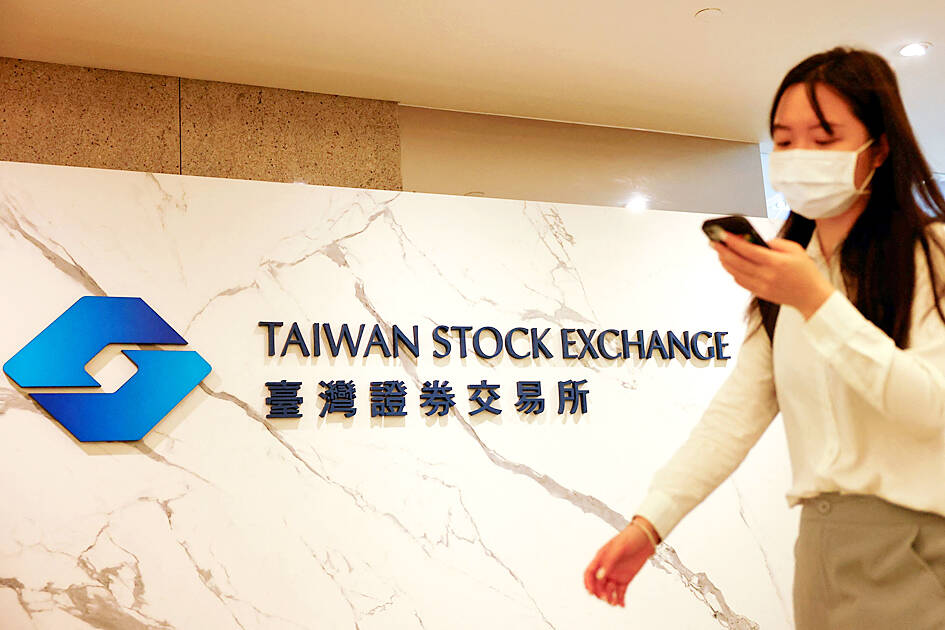Taipei is today suspending its US$2.5 trillion stock market as Super Typhoon Krathon approaches Taiwan with strong winds and heavy rain.
The nation is not conducting securities, currency or fixed-income trading, statements from its stock and currency exchanges said. Yesterday, schools and offices were closed in several cities and counties in southern and eastern Taiwan, including in the key industrial port city of Kaohsiung.
Taiwan, which started canceling flights, ship sailings and some train services earlier this week, has wind and rain advisories in place for much of the island. It regularly experiences typhoons, and in July shut offices and schools as well as suspended the financial markets for two days as Typhoon Gaemi brought strong winds and heavy rain.

Photo: Carlos Garcia Rawlins, Reuters
Taiwan Stock Exchange is home to Taiwan Semiconductor Manufacturing Co (TSMC, 台積電), the world’s largest contract chipmaker, and traders are keenly watching for any possible disruption from the typhoon.
TSMC has activated routine typhoon alert preparation procedures at all its fabs and construction sites in the island, according to an emailed statement from the company. The main chipmaker for Apple Inc and Nvidia Corp said it doesn’t expect a significant impact on operations.
Taiwan’s market suspension comes after volatile trading in recent days. The benchmark TAIEX fell 2.6 percent on Monday, its biggest drop in more than three weeks, before a rebound yesterday amid a technical rebound by large-cap tech stocks, TSMC in particular.
The TAIEX ended up 165.85 points, or 0.75 percent, at 22,390.39. Turnover totaled NT$279.37 billion (US$8.77 billion), exchange data showed.
After falling 4.30 percent on Monday, TSMC, the most heavily weighted stock in the local market, rose 1.57 percent to close at NT$972.
Bucking the uptrend, iPhone assembler Hon Hai Precision Industry Co (鴻海精密), second to TSMC in terms of market value, lost 0.27 percent to close at NT$187.
Additional reporting by CNA

SEMICONDUCTORS: The German laser and plasma generator company will expand its local services as its specialized offerings support Taiwan’s semiconductor industries Trumpf SE + Co KG, a global leader in supplying laser technology and plasma generators used in chip production, is expanding its investments in Taiwan in an effort to deeply integrate into the global semiconductor supply chain in the pursuit of growth. The company, headquartered in Ditzingen, Germany, has invested significantly in a newly inaugurated regional technical center for plasma generators in Taoyuan, its latest expansion in Taiwan after being engaged in various industries for more than 25 years. The center, the first of its kind Trumpf built outside Germany, aims to serve customers from Taiwan, Japan, Southeast Asia and South Korea,

Gasoline and diesel prices at domestic fuel stations are to fall NT$0.2 per liter this week, down for a second consecutive week, CPC Corp, Taiwan (台灣中油) and Formosa Petrochemical Corp (台塑石化) announced yesterday. Effective today, gasoline prices at CPC and Formosa stations are to drop to NT$26.4, NT$27.9 and NT$29.9 per liter for 92, 95 and 98-octane unleaded gasoline respectively, the companies said in separate statements. The price of premium diesel is to fall to NT$24.8 per liter at CPC stations and NT$24.6 at Formosa pumps, they said. The price adjustments came even as international crude oil prices rose last week, as traders

Taiwan Semiconductor Manufacturing Co (TSMC, 台積電), which supplies advanced chips to Nvidia Corp and Apple Inc, yesterday reported NT$1.046 trillion (US$33.1 billion) in revenue for last quarter, driven by constantly strong demand for artificial intelligence (AI) chips, falling in the upper end of its forecast. Based on TSMC’s financial guidance, revenue would expand about 22 percent sequentially to the range from US$32.2 billion to US$33.4 billion during the final quarter of 2024, it told investors in October last year. Last year in total, revenue jumped 31.61 percent to NT$3.81 trillion, compared with NT$2.89 trillion generated in the year before, according to

PRECEDENTED TIMES: In news that surely does not shock, AI and tech exports drove a banner for exports last year as Taiwan’s economic growth experienced a flood tide Taiwan’s exports delivered a blockbuster finish to last year with last month’s shipments rising at the second-highest pace on record as demand for artificial intelligence (AI) hardware and advanced computing remained strong, the Ministry of Finance said yesterday. Exports surged 43.4 percent from a year earlier to US$62.48 billion last month, extending growth to 26 consecutive months. Imports climbed 14.9 percent to US$43.04 billion, the second-highest monthly level historically, resulting in a trade surplus of US$19.43 billion — more than double that of the year before. Department of Statistics Director-General Beatrice Tsai (蔡美娜) described the performance as “surprisingly outstanding,” forecasting export growth